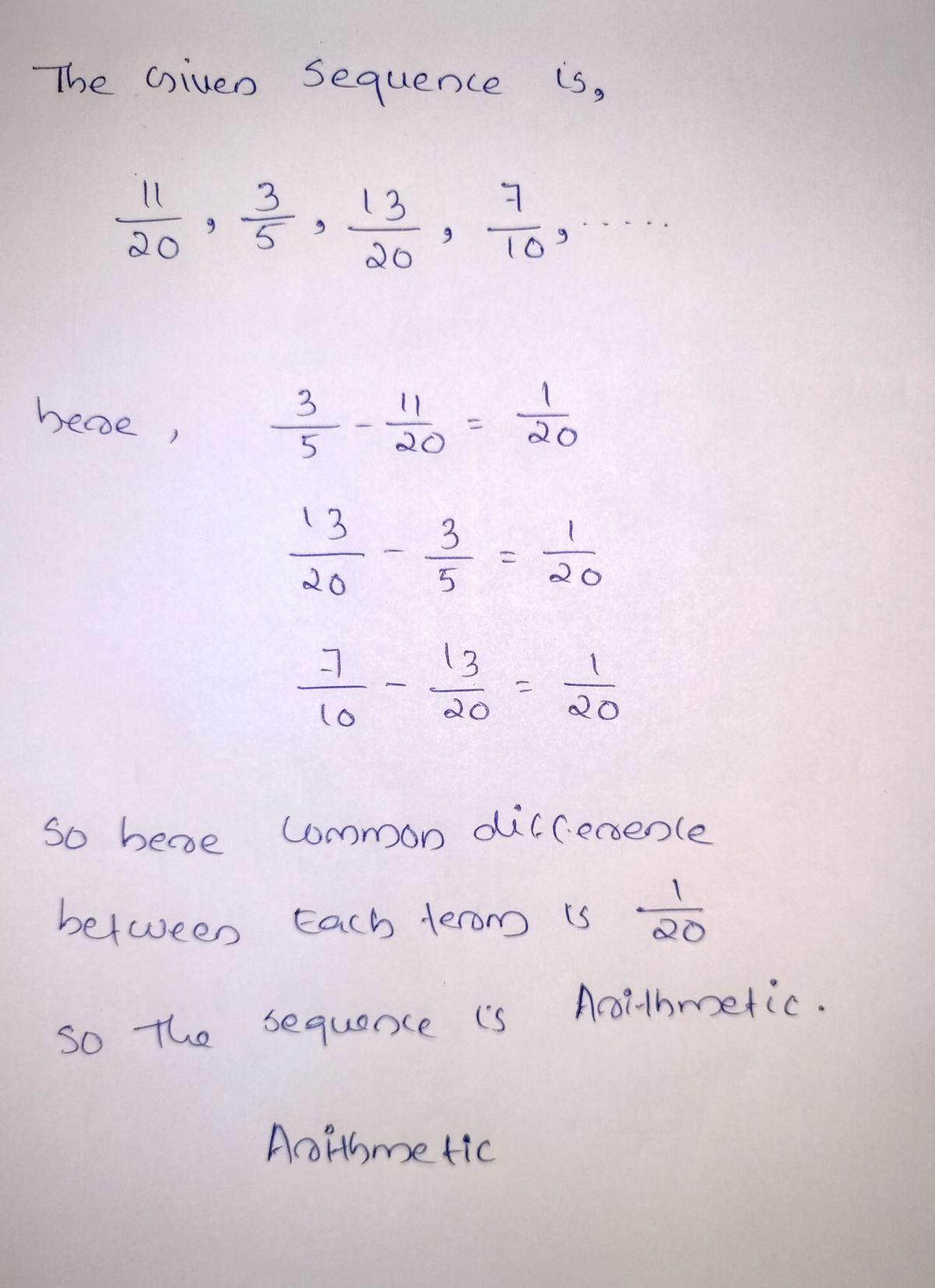**Exercise on Sequence Classification** Consider the following sequence: \[ \frac{11}{20}, \frac{3}{5}, \frac{13}{20}, \frac{7}{10}, \ldots \] (a) **Classification** Classify the sequence as one of the following: - Arithmetic - Geometric - Fibonacci - None of these *Note: The checked option is "Fibonacci" with a red cross indicating an incorrect choice.* (b) **Parameter Identification** - If the sequence is arithmetic, provide the common difference \( d \). - If geometric, provide the common ratio \( r \). - If neither, write "NONE." *Note: The box is left blank.* (c) **Next Term Prediction** Supply the next term in the sequence. *Note: The input given is \( \frac{9}{10} \) with a red cross indicating an incorrect answer.*
**Exercise on Sequence Classification** Consider the following sequence: \[ \frac{11}{20}, \frac{3}{5}, \frac{13}{20}, \frac{7}{10}, \ldots \] (a) **Classification** Classify the sequence as one of the following: - Arithmetic - Geometric - Fibonacci - None of these *Note: The checked option is "Fibonacci" with a red cross indicating an incorrect choice.* (b) **Parameter Identification** - If the sequence is arithmetic, provide the common difference \( d \). - If geometric, provide the common ratio \( r \). - If neither, write "NONE." *Note: The box is left blank.* (c) **Next Term Prediction** Supply the next term in the sequence. *Note: The input given is \( \frac{9}{10} \) with a red cross indicating an incorrect answer.*
Calculus: Early Transcendentals
8th Edition
ISBN:9781285741550
Author:James Stewart
Publisher:James Stewart
Chapter1: Functions And Models
Section: Chapter Questions
Problem 1RCC: (a) What is a function? What are its domain and range? (b) What is the graph of a function? (c) How...
Related questions
Question
![**Exercise on Sequence Classification**
Consider the following sequence:
\[ \frac{11}{20}, \frac{3}{5}, \frac{13}{20}, \frac{7}{10}, \ldots \]
(a) **Classification**
Classify the sequence as one of the following:
- Arithmetic
- Geometric
- Fibonacci
- None of these
*Note: The checked option is "Fibonacci" with a red cross indicating an incorrect choice.*
(b) **Parameter Identification**
- If the sequence is arithmetic, provide the common difference \( d \).
- If geometric, provide the common ratio \( r \).
- If neither, write "NONE."
*Note: The box is left blank.*
(c) **Next Term Prediction**
Supply the next term in the sequence.
*Note: The input given is \( \frac{9}{10} \) with a red cross indicating an incorrect answer.*](/v2/_next/image?url=https%3A%2F%2Fcontent.bartleby.com%2Fqna-images%2Fquestion%2Fd07994a3-ee76-4b10-92bd-231d257716ed%2Fb6c79ac9-5d98-4c8b-a548-2f4e8ccf96e3%2Fi00ym.jpeg&w=3840&q=75)
Transcribed Image Text:**Exercise on Sequence Classification**
Consider the following sequence:
\[ \frac{11}{20}, \frac{3}{5}, \frac{13}{20}, \frac{7}{10}, \ldots \]
(a) **Classification**
Classify the sequence as one of the following:
- Arithmetic
- Geometric
- Fibonacci
- None of these
*Note: The checked option is "Fibonacci" with a red cross indicating an incorrect choice.*
(b) **Parameter Identification**
- If the sequence is arithmetic, provide the common difference \( d \).
- If geometric, provide the common ratio \( r \).
- If neither, write "NONE."
*Note: The box is left blank.*
(c) **Next Term Prediction**
Supply the next term in the sequence.
*Note: The input given is \( \frac{9}{10} \) with a red cross indicating an incorrect answer.*
Expert Solution
Step 1

Step by step
Solved in 2 steps with 2 images

Recommended textbooks for you

Calculus: Early Transcendentals
Calculus
ISBN:
9781285741550
Author:
James Stewart
Publisher:
Cengage Learning

Thomas' Calculus (14th Edition)
Calculus
ISBN:
9780134438986
Author:
Joel R. Hass, Christopher E. Heil, Maurice D. Weir
Publisher:
PEARSON

Calculus: Early Transcendentals (3rd Edition)
Calculus
ISBN:
9780134763644
Author:
William L. Briggs, Lyle Cochran, Bernard Gillett, Eric Schulz
Publisher:
PEARSON

Calculus: Early Transcendentals
Calculus
ISBN:
9781285741550
Author:
James Stewart
Publisher:
Cengage Learning

Thomas' Calculus (14th Edition)
Calculus
ISBN:
9780134438986
Author:
Joel R. Hass, Christopher E. Heil, Maurice D. Weir
Publisher:
PEARSON

Calculus: Early Transcendentals (3rd Edition)
Calculus
ISBN:
9780134763644
Author:
William L. Briggs, Lyle Cochran, Bernard Gillett, Eric Schulz
Publisher:
PEARSON

Calculus: Early Transcendentals
Calculus
ISBN:
9781319050740
Author:
Jon Rogawski, Colin Adams, Robert Franzosa
Publisher:
W. H. Freeman


Calculus: Early Transcendental Functions
Calculus
ISBN:
9781337552516
Author:
Ron Larson, Bruce H. Edwards
Publisher:
Cengage Learning